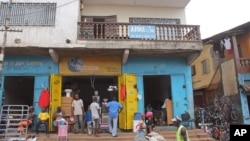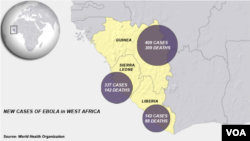The World Health Organization says the Ebola epidemic circulating in three West African countries shows no signs of diminishing and fears it is likely to continue for many months. Latest WHO figures put the number of cases of this deadly disease at 964, including 603 deaths.
The deadly Ebola virus is continuing to spread in Guinea, Sierra Leone and Liberia nearly four months after it was first detected in remote forest communities of Guinea. There is no vaccine or cure for the virus, which is spread through direct contact with bodily fluids from an infected person.
The World Health Organization reports Ebola victims in West Africa are dying at a rate of 60 percent. WHO spokesman Dan Epstein said it probably would be several months before governments and health agencies got a grip on this epidemic and cases of the disease started going down.
“It is pretty horrifying, I think, anytime you have an epidemic that has a case fatality rate of above 50 percent where more than half the people infected die, it is horrifying. So, of course, we are very worried and that is why we are increasing our efforts. In terms of how long it will take, it is very hard to predict. It depends on our success in the five important areas of epidemiology, contact tracing, education very importantly, community level participation, changing of habits of burial practices,” he said.
There have been periodic outbreaks of Ebola in Africa since it was first detected in the mid-1970s in the Democratic Republic of Congo, then known as Zaire. This is the first outbreak of the disease in West Africa and it is proving to be the deadliest on record.
Since people have no experience with the disease, they do not know how the virus is transmitted. People often refuse treatment because they are suspicious of health workers.
Epstein said this was a huge impediment toward stopping its spread. He said it was important to trace all people who have been in contact with an infected person in order to contain the disease.
He told VOA it was very difficult for foreign health workers to get into communities because they were viewed with hostility, intimidated and often driven away by the residents.
“It is really kind of a matter of rumor control. It is myths and facts. So we have to dispel these myths about Ebola that are prevalent and that are circulating as rumors that are very damaging. You know like the myth that foreigners are bringing Ebola to your villages or that if you go to the hospital, you will die and they will take your organs. Or crazy bits like that are hard to dispel."
"So, it is early to say whether we are being successful, but we are certainly increasing our effort in education and social mobilization in villages in all the three countries,” he said.
Epstein said WHO was reaching out to religious and traditional leaders for help in gaining the confidence of villagers so health workers could break this damaging cycle of suspicion and bring the epidemic to an end.






